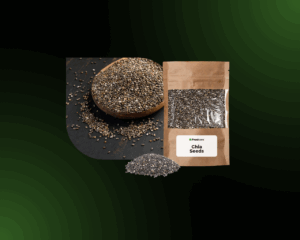- Cocoa prices remain high following poor harvests in West Africa and plantation diseases.
- Chia seeds are becoming more expensive due to limited harvests in Latin America and restrictive standards in Europe.
- Hazelnuts from Turkey have risen sharply in price, and Europe is becoming increasingly dependent on imports.
- India is strengthening its export position thanks to record grain stocks, while the US and Pakistan are struggling with tensions destabilising local markets.
The global market for plant-based raw materials is changing at a dizzying pace. Cocoa is getting more expensive after a poor harvest in West Africa, chia is losing availability through a limited crop in Latin America and Turkish hazelnuts are hitting record prices. India is building power with its huge grain stocks, while the US and Pakistan are facing turbulence of their own. This is a moment when producers and consumers must keep a close eye on every market move.
Cocoa
A great deal of uncertainty persists in the global cocoa market. In West Africa, particularly in Cameroon, black pod disease has decimated some plantations, and previous adverse weather conditions in Ghana and Côte d’Ivoire have caused a strong decline in yields, pushing cocoa prices to record levels over the past two years. Although quotations have retreated slightly in recent weeks due to cost pressures in the industry and slightly weaker demand, the market is looking anxiously at the upcoming festive season, which traditionally generates an increase in demand for chocolate and confectionery products. This is likely to put pressure on prices again, especially if crop conditions do not improve and the fight against plant diseases does not yield quick results.
See also: Cocoa – what is its cultivation and production like?
Chia seeds
The chia seed market has remained under clear pressure so far in August and September: a limited harvest in Latin America and restrictive quality standards in Europe are keeping supply low, while demand from plant food producers is not waning. As a result, prices on international markets remain stable, although still high, and the organic segment is seeing additional premiums due to shortages and growing consumer interest. Exporters are signalling caution about further supplies, pointing to the vulnerability of supply to weather conditions in Paraguay or Bolivia, and European importers are increasingly struggling with rising logistics costs.
Hazelnuts
The global hazelnut market remains under severe pressure. Turkey, accounting for around 70% of global supply, is struggling with the effects of frost and drought, which severely limited this year’s harvest. Estimates point to a production of less than 400,000 tonnes, tens of per cent less than in a typical season. As a result, official purchase prices in Turkey have risen by more than 50 per cent year-on-year and currently stand at around 4.08-4.17 EUR/kg. On the European market, contracts are at over EUR 10/kg. Europe, where own production is virtually disappearing, is becoming increasingly dependent on imports, mainly from Turkey. Forecasts point to further market value growth of 6-9 per cent per year, but in an environment of limited supply and rising costs.
What else?
India
India entered September with historically high grain stocks. The state’s rice stockpiles stood at 48.2 million tonnes – far above the government’s forecast of 13.5 million tonnes. In addition, wheat reserves reached their highest level in four years. Such a strong storage base gives the government the opportunity to stabilise prices in the domestic market, which was particularly problematic during the period of increased demand during the autumn festivals. The Rice Exporters Association forecasts that overseas sales will increase by nearly 25% this year to reach a record 22.5 million tonnes, cementing India’s position as the world’s largest supplier of the grain.
United States
Donald Trump’s administration is working on a plan to use tariff revenues to fund a support programme for US farmers. The initiative is a response to the effects of the trade war with China, including the halting of soybean purchases and the rising cost of fertiliser, machinery and other imported inputs. Agriculture remains one of the main areas of tension between the two countries, and the planned
Pakistan
Tensions are mounting in Pakistan over informal restrictions on the movement of wheat from Punjab to other regions of the country. A decision by provincial authorities to introduce checkpoints to monitor grain shipments has led to severe flour shortages and soaring prices. In some parts of the country, a 20-kg bag of flour costs as much as Rs 2,800, while in Punjab the price hovers around Rs 1,800. These actions go against the principle of free trade and destabilise the market, causing artificial shortages and price pressure. The concern is the impact on farmers who, in the absence of stable and predictable conditions, may reduce sowing in the coming season. Pakistan may be forced to increase grain imports at higher prices on international markets, adding to the pressure on the economy.

![Crop uncertainty and rising costs – the global plant market facing challenges [78th Edition of PLANT-BASED Newsletter] Crop uncertainty and rising costs – the global plant market facing challenges [78th Edition of PLANT-BASED Newsletter]](https://foodcom.pl/wp-content/uploads/2023/08/Foodcom_Newsletter_Plant-Based-1520x760.jpg)


![Prices under pressure, yields in surplus – the plant market in the face of global imbalance [77th Edition of the PLANT-BASED Newsletter] Prices under pressure, yields in surplus – the plant market in the face of global imbalance [77th Edition of the PLANT-BASED Newsletter]](https://foodcom.pl/wp-content/uploads/2024/06/Foodcom_SA_Plant-Based_Newsletter_9-600x300.jpg)
![Trends in the market for plant-based products and the hidden risks behind stable prices [76th Edition of the PLANT-BASED Newsletter] Trends in the market for plant-based products and the hidden risks behind stable prices [76th Edition of the PLANT-BASED Newsletter]](https://foodcom.pl/wp-content/uploads/2023/08/Foodcom_Plant-Based_Newsletter-600x300.jpg)
![From hazelnuts to chia – what’s driving the plant-based market now? [75th Edition of the PLANT-BASED Newsletter] From hazelnuts to chia – what’s driving the plant-based market now? [75th Edition of the PLANT-BASED Newsletter]](https://foodcom.pl/wp-content/uploads/2023/08/Foodcom_Newsletter_Plant-Based-600x300.jpg)

